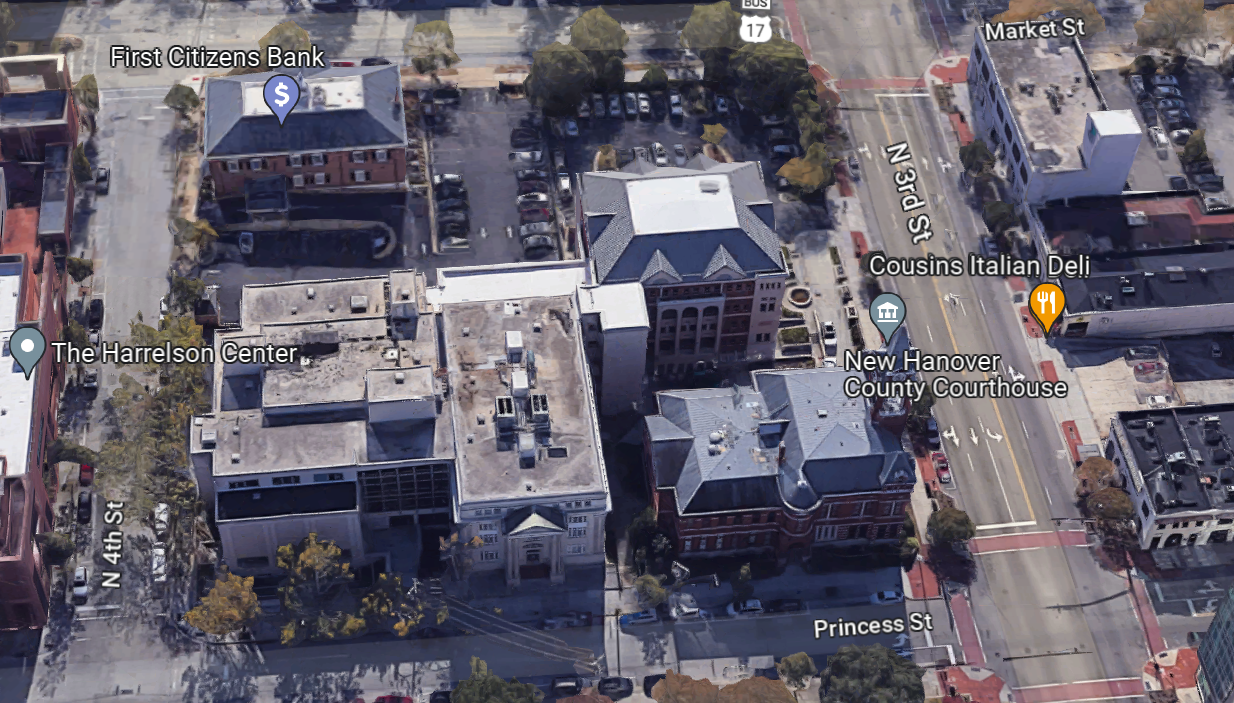The New Hanover County Courthouse in Wilmington, North Carolina is a historic building and serves as the seat of New Hanover County. It was constructed in 1892 at the corner of 3rd Street and Princess Street and was designed by architects Alfred Eichberg and James F. Post. In 1925, an annex was added to the courthouse.
It is open between 8:00 AM through 5:00 PM, Monday through Friday.
New Hanover County District Attorney: Ben David
Address: 316 Princess St Wilmington, NC 28401

GETTING THERE
Getting to the courthouse can vary depending on your location and transportation options. If you have access to a car, make sure to leave time for parking. Handicap parking spots and access are available at the back of the building, while other parking options include the Ligon-Flynn Lot, the Second Street Parking Lot, or the City of Wilmington 2nd Street Parking Deck, all located within a few blocks from the courthouse. Metered parking is also available on the street.

If you do not have a car, public transportation may be an option. Check local bus or train schedules to see if they have a stop near the courthouse.
It is important to plan ahead and allow enough time to get to the courthouse. Traffic and parking can be unpredictable, and arriving late can have serious consequences, such as missing your court appearance and having a warrant issued for your arrest.

ENTERING
To ensure security, all visitors to the courthouse must go through a screening process. It’s advisable to arrive early for your court appointment, as there may be a queue. If you have a disability and require special assistance, you can contact the Disability Access Coordinator (DAC) at the courthouse. To reach the DAC in New Hanover County, you can call 910-772-6603
FINDING YOUR ROOM
To avoid confusion, it’s important to know the exact time, date, and location of your criminal court case. You can find this information on your citation, warrant, or Magistrate’s paperwork. Alternatively, you can check online or contact the Superior Court Clerk’s office in the county where your case will be heard.
Once you arrive at the courthouse and pass through the security check, make your way to the correct courtroom. In New Hanover County, you can find a docket displaying the schedule near the elevators on the entry floor. Look for your last name and case number on the docket to confirm the correct courtroom.
TIMELINE
It’s crucial to be aware of the day and time of your court appearance. Your lawyer, if you have one, will advise you whether you need to attend court or if they will handle your case without your presence. If you don’t have a legal representative, you must attend court in person.
The prosecutor assigned to your case will call out all the scheduled cases in the courtroom. You must wait for your turn and respond when called upon to confirm your presence. It’s essential not to miss the court call, as failing to appear may result in a warrant for your arrest.
Keep in mind that court proceedings can take the entire day. Plan accordingly by taking time off work and arranging for childcare for the entire duration of the court call. Many cases require multiple appearances. If this is an issue, it is important you hire an attorney who can be there on your behalf.
BE PREPARED
It’s important to understand the purpose of your court appearance, as there are various types of hearings for which you may be required to attend. These include arraignment, bond hearing, show cause hearing, pre-trial status conference, motion hearing, plea, or jury trial. Each hearing type serves a different purpose, and it’s advisable to seek legal counsel to comprehend what’s happening in your case.
At an arraignment, your plea is typically the only matter that requires your attention, whereas at a trial, you must be fully prepared to present and argue your case. It’s crucial to consult a lawyer, as they can advise you on what to expect and guide you through the legal process.
WHAT TO WEAR
Since court is a formal setting, it’s important to dress appropriately and presentably. While a full suit may not be necessary, it’s advisable to wear business casual attire, such as slacks and a dress shirt or blouse. Choose conservative clothing options and make sure your legs and arms are covered. Keep in mind that dressing inappropriately may negatively impact how you’re perceived in court, so avoid wearing overly casual or revealing outfits. Remember that presenting yourself respectfully can demonstrate your respect for the legal process.
The need to bring evidence to court varies based on the type of hearing. While you wouldn’t require evidence for an arraignment, you might need it for a motion hearing or trial. If you’re representing yourself, bring at least three copies of each piece of evidence — one for yourself, one for the judge, and one for the prosecutor.
When presenting evidence to the judge, clearly identify and explain what it is and how you know it’s genuine. A bailiff will take the evidence from you, show it to the other party, or provide them with a copy, and then present it to the judge. The prosecutor may object to the evidence for legal reasons, and the judge can decide to exclude its use.
If you work with an attorney, they can assist in preparing you for the court appearance, including what evidence to bring and how to present it. It’s always advisable to seek legal guidance to ensure that you have the strongest case possible.
WHAT YOU’LL SEE
When you enter the courtroom, you will see a designated seating area for defendants and witnesses separated by a bar or railing from the rest of the courtroom. The prosecutor will be seated at a table, while the defendant and their attorney will be seated at another table. In the event of a jury trial, there will be a specific seating area for the jury, but it will be unoccupied unless there is an ongoing trial. A court clerk will be present at the front of the courtroom to keep track of cases and record decisions. If it is a Superior Court, there will be a court reporter or stenographer to keep a record of the hearing. Bailiffs, who are typically local sheriff’s deputies, will be present for security and to maintain order in the courtroom. If you have an attorney, you can locate them to discuss your case and wait for your turn to speak to the judge.
COURTROOM COMMUNICATION
It is important to keep in mind that any discussions or negotiations between parties during a court call must be done with the approval of the judge. The judge will want to know if the case has been resolved or if there are any issues that need to be addressed. If an agreement is reached, it will be put on the record in court and made part of the official court proceedings. It is always best to work with an attorney who can help guide you through any negotiations and ensure that your rights are protected.
If you are facing criminal charges, you don’t have to navigate the legal process by yourself. Brett Wentz, is an experienced attorney that can successfully navigate your situation. With his knowledge of the North Carolina court system, he can guide you through each step of the process and prepare you for all necessary court appearances.
